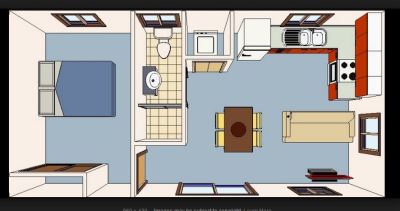 By David Garrick / San Diego Union-Tribune / Sept. 26, 2021
By David Garrick / San Diego Union-Tribune / Sept. 26, 2021
Growing outcry over granny flat construction in some San Diego neighborhoods has prompted city officials to propose rolling back some recent policy changes that have made San Diego’s rules among the least restrictive in California. Critics who say the city’s granny flat rules are too lenient are calling the recently proposed rollback from Councilmember Sean Elo-Rivera a good start, but they say it won’t prevent some property owners from destroying neighborhood character by building multiple granny flats in one back yard.
Ardent proponents say that granny flats — which city officials call accessory dwelling units or ADUs — are the cheapest and fastest way to solve San Diego’s housing crisis. They say Elo-Rivera’s new proposal is an overreaction to a problem that isn’t widespread and probably never will be. People on both sides of the issue agree that how the city balances its incentives to build granny flats with its restrictions on them will likely affect the look and feel of many San Diego neighborhoods for decades to come.
Elo-Rivera is proposing a series of complex adjustments to city granny flat rules that aim to increase their availability to low-income tenants and to prevent corporate investors from turning granny flats into a lucrative business. Elo-Rivera’s district includes Kensington and some other areas that have loudly opposed loosening granny flat rules. He wants new parking restrictions and a requirement to replace any trees removed to make way for a granny flat. He also proposes charging the owners of large granny flats ongoing maintenance fees, to help pay for new infrastructure needed to accommodate the additional residents living in a neighborhood’s granny flats. His six-page, multi-pronged proposal comes after the first backlash against the city’s looser granny flat rules emerged last spring in Kensington, Talmadge, Rolando and some nearby neighborhoods.
Vocal opposition has since spread to the College Area and some other communities, and the opponents have formed a well-organized lobbying organization called Neighbors for a Better San Diego. While the group is praising Elo-Rivera for addressing the issue and applauding some of his ideas, they stress that his proposal would not eliminate one issue that has prompted the most opposition — a granny flat density bonus.
That policy, adopted last fall by the City Council, goes beyond current state law by allowing property owners to construct extra granny flats on their property if they agree to rent restrictions on at least one of their granny flats. While state law does not include bonus units, San Diego allows any property owner willing to build a rent-restricted granny flat to build one bonus granny flat that can be rented at market rate. And if the property is within a half-mile of an existing or planned transit line, the property owner can build multiple bonus granny flats if they also build an equal number of rent-restricted flats.
The residents say that “density bonus” will destroy neighborhood character, making residential zoning mostly meaningless. They said it also will exacerbate parking scarcity in many neighborhoods and lengthen the time it takes to get to freeways in others. “The density bonus has made the (granny flats) program more impactful than it has to be,” said Geoff Heuter, one of the group’s leaders. “We like some of Elo-Rivera’s proposals, but there’s a gap between what he is proposing and what needs to be done.”
For the balance of this article, please go here.
